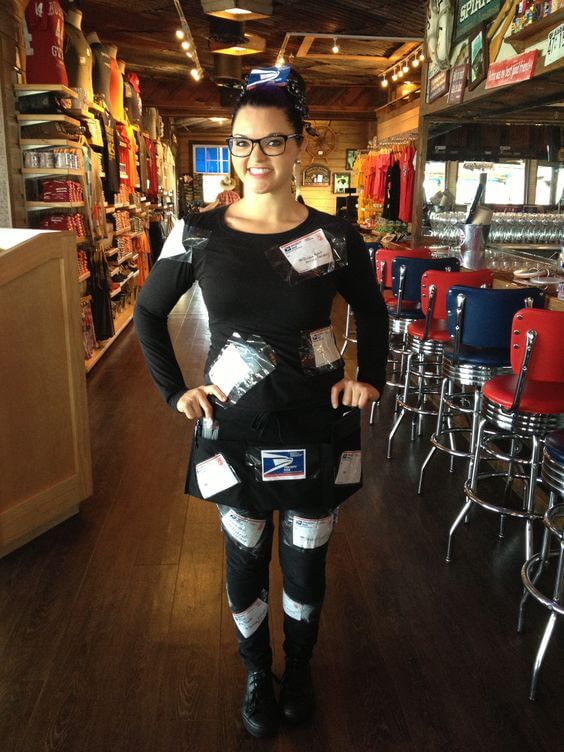6 Costumes that Perpetuate Unhealthy Relationship Behaviors
‘Tis the season for cozy sweaters, all things pumpkins and Hocus Pocus on repeat (all day, e’ry day). If you’re anything like me, you’re also meticulously plotting your Halloween costume and trying to figure out the maximum number of days you can dress up pre- and- post- October 31st before you start getting weird looks (Halloween Week, amirite?!?!).
Whether you have one costume or five, you can do your part this Halloween season to make sure you and others are conscious of your wardrobe decisions. While it’s fun to dress up and play a different role, some costumes could validate or amplify unhealthy or abusive relationship behaviors. Here are 6 Halloween costumes you should definitively not wear (or let others wear) and the reasons why. While it’s fun to dress up, some costumes should stay in the closet (with those skeletons).
1. Ball & Chain

What it perpetuates: Control
There’s nothing that gets me excited like a good pun turned into a Halloween costume (self-omission: I’ve dressed up as a Freudian Slip for at least 4 different Halloweens). However, some puns should be left in the closet, like those skeletons. While dressing up with a friend as the good ‘ole ball & chain may feel fun and witty, it actually perpetuates controlling behaviors. The ball and chain costume shows a person being restrained or kept against their will by someone else. In an unhealthy relationship, abusers will use tactics to gain control over their victim, like making someone feel as though they have to always check-in or isolating them from friends and family. Sometimes, the abuse can even be so bad that a victim will feel like they have to get permission to do anything and the victim feels like a prisoner in their own relationship.
Try Instead: Peas in a Pod, Peanut Butter + Jelly, Nuts & Bolts
2. Blackmail

What it perpetuates: Manipulation, Threats
Creative, but no. Why? In unhealthy and emotionally abusive relationships, abusers will use blackmail as a way to manipulate and threaten their significant other. Abusers will say things like, “If you break up with me, I’ll tell everyone that,…” or “If you don’t do what I tell you to do, I’ll post those pics everywhere,…” or “I’ll hurt myself if you end it with me,…”. This type of behavior and costume are not OK because it sends a sign to others that blackmail is funny or acceptable when in reality, blackmail is used as a form of manipulation.
Try Instead: A UPS Man or Woman, a postcard, a costume that involves wearing chain mail (if you really want to stick with that “mail” theme)
3. Wife Beater

What it perpetuates: Domestic violence, physical violence
Colloquially it’s a type of shirt. And while we could get into the etymology and origins of the word, at the end of the day it doesn’t matter and it’s STILL not ok and perpetuates domestic violence. Every 9 seconds in the US a woman is assaulted or beaten[1] and on a typical day, domestic violence hotlines nationwide receive approximately 20,800 calls[2]. This is a problem of epidemic proportions. So while your ribbed, tank-style undershirt may be a must-have in your wardrobe, it certainly should not be the inspiration for any costume.
Try Instead: Feminist
4. Assault + Battery

What it perpetuates: Physical violence
Don’t let the self-proclaimed pun masters in your life use this as inspiration for their Halloween get-up. If you need a few stats to remind them why it’s so distasteful, feel free to drop these in convo: in the United States, an average of 20 people are physically abused by intimate partners every minute (equating to 10 million abuse victims each year)[3]; or 1 in 3 women and 1 in 4 men is a victim of some form of physical violence by an intimate partner during their lifetimes.[3] Not so funny anymore, right?
Try Instead: Dunkin Donuts, Salt and Pepper (the condiments or rap duo – whichever you fancy), Elsa and Anna
5. Rohypnol

What it perpetuates: Date rape, rape culture
Sigh. Friends don’t let friends even THINK about dressing as rohypnol for Halloween. Rohypnol is also commonly called “roofie” or “the date rape drug”. In 8 out of 10 rape cases, the victim knows the attacker.[4] And while we’re not saying that all rape cases are a result of rohpynol, we are saying that dressing up as “the date rape drug” only perpetuates rape culture. Which is not cool. (Btw, if you want to learn more about sexual assault, specifically on campus, check out our friends at It’s On Us and End Rape on Campus).
Try Instead: Pretty much any other thing you put in a drink that doesn’t cause someone to lose their senses or completely blackout – like an olive, a lime, marshmallows. You get the idea.
6. Harley Quinn + the Joker

What it perpetuates: Relationship abuse, emotional abuse
Suicide Squad may have been a Blockbuster hit this summer, but the relationship between Harley Quinn and the Joker is extremely abusive (in our expert opinions and others – seriously, Google “Harley Quinn and Joker abuse”). Their relationship shows several signs of emotional abuse – obsession, sexual exploitation, control, manipulation, fear and more. Instead, encourage your friends to dress up as power couples that exhibit love, adoration and a healthy relationship.
Try Instead: Obama and Michelle, Hazel and Augustus, Batman and Superwoman
These are just a few examples of Halloween costumes that perpetuate unhealthy or abusive relationship behaviors. Got any others?
[1] Bachman, R. & Saltzman, E. (1995). Violence against women: Estimates from the redesigned survey. Retrieved from http://www.bjs.gov/content/pub/pdf/FEMVIED.PDF
[2] National Network to End Domestic Violence (2015). ’14 domestic violence counts national summary. Retrieved from http://nnedv.org/downloads/Census/DVCounts2014/DVCounts14_NatlSummary_Color-2.pdf.
[3]Black, M.C., Basile, K.C., Breiding, M.J., Smith, S.G., Walters, M.L., Merrick, M.T., Chen, J. & Stevens, M. (2011). The national intimate partner and sexual violence survey: 2010 summary report. Retrieved from http://www.cdc.gov/violenceprevention/pdf/nisvs_report2010-a.pdf
[4] http://centerforfamilyjustice.org/community-education/statistics/
Browse by Category

Don’t Be on the Naughty List: Spotting Unhealthy Relationship Signs This Holiday Season
The holidays are meant for joy, connection, and celebration—whether it’s Christmas, Hanukkah, Kwanzaa, or cozy winter vibes. But if someone…
How to Have Healthy Holiday Conversations with Family (and Prep Your Partner)
The holidays are a time for family, good food, and—let's…
3.2 Million Strong: How One Love is Saving Lives Through Education
Please share this blog with your network across social media,…
Finding Strength in Our Stories: Domestic Violence Awareness Month
⚠️ Trigger Warning: This blog includes content and language related…
Understanding Domestic Violence Awareness Month (DVAM)
October is almost here, and that means it’s time to…














